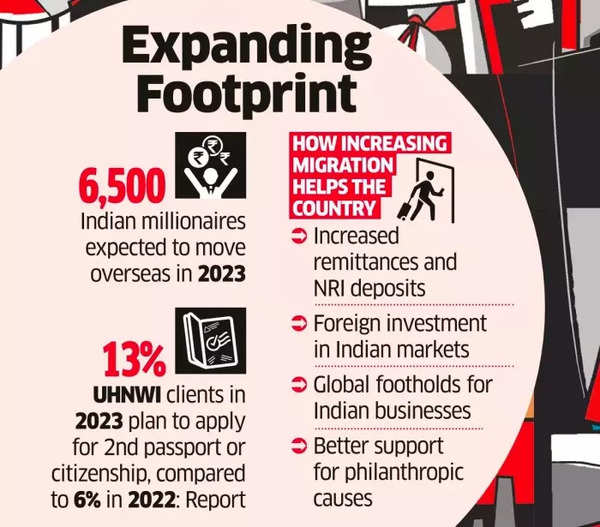It is estimated that 6,500 Indian millionaires with net investables of at least a million dollars are expected to relocate overseas in 2023. Vivek Rathi, national director-research at Knight Frank India told the financial daily that acquiring second passports by high net worth individuals (HNIs) is associated with benefits like increased investments, heightened trade activities, and a surge in remittances.
Increased remittances
The primary advantage of more Indians going abroad is an increase in remittances. India has the largest migrant population globally, and in 2020, remittances amounted to $83.2 billion, the highest in the world, with China coming in second at $59.5 billion. The trend of remittances is expected to continue growing as more HNIs pursue citizenship or golden visa programs in countries like the US, UK, Middle East, and Singapore. (The US has consistently been the top remittance-sending country with a total outflow of $68 billion in 2020.)
Remittances help stabilize India’s current account deficit and provide a guaranteed source of income.
Madan Sabnavis, chief economist at the Bank of Baroda, explains that remittances have consistently increased, except during the pandemic when production activities were halted. Remittances to India were only $12.9 billion in 2000 but had grown to $53.5 billion by 2010, according to a 2020 World Migration report.
How increasing migration helps India
Abheek Barua, chief economist at HDFC Bank, emphasizes that although it is challenging to predict the direct impact of HNIs pursuing investment migration programs on the Indian economy, NRI deposits and remittances from this segment can help in the long term by providing much-needed dollar flows.
Barua also points out a shift in the source of remittances, with a decrease in dominance from the Middle East and an increase from countries like the US, attributed to the growing number of skilled Indian workers there. Investment migration programs, along with skilled visas, are avenues through which people migrate globally.
Also Read | NRI passport renewal guide: How NRIs can renew Indian passport from within India & abroad
Going global
Concerns have been raised about potential brain drain resulting from more HNIs moving abroad. However, Dr. Kristin Surak, associate professor at LSE and author of “The Golden Passport: Global Mobility for Millionaires,” explains that individuals pursuing citizenship-by-investment or residence-by-investment programs may not necessarily relocate. They may use these schemes to gain more mobility and increase their options for the future, she says. People often pursue programs in countries like Malaysia, Thailand, United Arab Emirates, Panama, and South Korea to expand their bases while maintaining a strong foothold in India, where their businesses are primarily located, she added.
The ease of establishing or structuring businesses overseas is one reason why individuals consider residence or citizenship programs. They can set up their companies abroad and establish subsidiaries or knowledge process outsourcing (KPO) centers in India, allowing money to flow back into the country, says Beri. “Or they could do a reverse integration into Singapore. I know of large business families that are increasingly insisting on having at least one family member become an NRI (not necessarily change their passport) because it could help the family business go global,” Beri adds.
Surak highlights the importance of mobility in growing businesses and states that citizenship by investment programs can enhance business success, which ultimately benefits India.
Leveraging a global diaspora
The government plays a crucial role in leveraging the increase in wealthy HNIs pursuing these programs. Creating an enabling regulatory environment that appeals to both Indian HNIs and foreign investors can outweigh potential drawbacks such as talent and investment drain from India, says Rathi. Surak suggests that offering different nationality statuses, especially for those who have naturalized abroad, can strengthen the ties between the Indian diaspora and the country.
Also Read | New TDS certificate rules for NRIs: Want a lower or nil Tax Deduction at Source certificate? Here’s what you should know
Philanthropic interests
Another benefit of more Indians moving abroad is their contribution to India’s development programs through philanthropic efforts. NRIs in the US, for example, actively support causes such as healthcare, education, and nutrition in India. They send money to support hospitals, offer free medical services in villages, and contribute to programs focused on child education and welfare.
With a growing Indian diaspora in critical wealth hubs, the narrative around brain drain is shifting towards the understanding that Indians succeeding abroad can also be beneficial for India.
